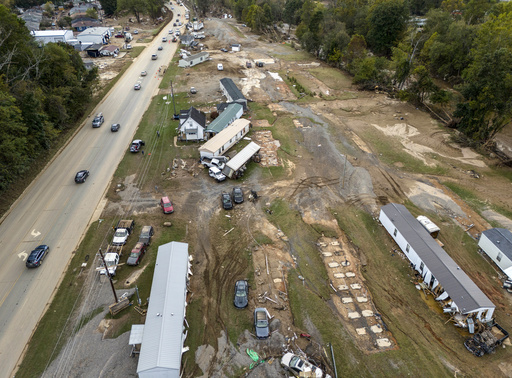
(RNS) — This past Sunday marked a significant moment for congregants at Biltmore Church, a megachurch in Asheville, North Carolina, as they gathered for in-person services for the first time following Hurricane Helene’s devastation in the region. Pastor Bruce Frank described the atmosphere as bittersweet, noting a blend of relief and sorrow among attendees. “There is a lot of loss,” he remarked during his message.
Among those deeply affected by the disaster were local lay leaders Nora and Michael Drye and their 7-year-old grandson, Micah, who tragically lost his life after becoming trapped on their roof due to the flooding caused by Helene. Many other members of the congregation are facing similar heartbreaks, having lost loved ones, their homes, and their means of making a living.
In the wake of the disaster, the church community has come together to support those in need. They have opened their parking lot to relief organizations and state workers, facilitating stations where community members can collect essential items such as water, ice, diapers, and food, as explained by Pastor Frank.
Additionally, the church is spearheading a donation initiative through a new website named 828Strong, a title inspired by the Asheville area code. In the weeks leading up to the hurricane, congregants had been studying the New Testament’s Letter of James, which emphasizes the importance of action alongside faith. Frank emphasized that this lesson has manifested in the actions of church members helping their neighbors in the wake of the storm’s devastation.
Looking ahead, Frank believes the upcoming months will resemble a “stay-at-home mission trip,” as congregants rally to support their local communities. After experiencing the impacts of both Hurricane Helene and Hurricane Milton in succession, faith-based disaster relief organizations are preparing for a protracted recovery process that could span years. “It’s going to take a long time,” Frank acknowledged, noting that his church is collaborating closely with North Carolina Baptist Disaster Relief, which has already provided over 100,000 meals cooked in the church parking lot to those in need.
Meanwhile, around two hours away in Boone, North Carolina, Samaritan’s Purse—a humanitarian organization headed by evangelist Franklin Graham—has been actively engaged in relief efforts. They are clearing debris, establishing water filtration systems, and delivering supplies by helicopter to isolated communities impacted by the storms. In remote areas, the group has implemented around 50 Starlink units to restore internet connectivity and provided generators for electricity. Graham also mentioned setting up oxygen shelters for individuals unable to receive their regular supplies, successfully replenishing over 1,000 oxygen tanks.
More than 16,000 volunteers have joined these efforts, with expectations for more to come. Activities are ongoing in regions ranging from Georgia to Florida, in addition to local initiatives in North Carolina, with the necessity for support likely continuing in the coming months. Plans are also underway for long-term rebuilding efforts, which include recruiting leadership for these projects and coordinating with suppliers for necessary materials. On the ground, volunteers are already engaged in installing culverts for drainage and reconstructing roads damaged by the floods.
Despite the political climate, Graham expressed a silver lining in focusing on recovery rather than partisanship. “Nobody’s talking about Democrats or Republicans,” he commented, adding that the focus now is purely on aiding those affected.
Another volunteer organization, Eight Days of Hope, is responding swiftly to the dual impacts of Hurricanes Helene and Milton by setting up mobile feeding stations and providing facilities for laundry and showers. Spokesperson Hannah Fletcher noted, “If you need a warm shower or laundry services, you can come and utilize those while enjoying a warm meal.” Following their work in response to Hurricane Milton, the organization plans to continue its relief efforts throughout October in areas impacted by Helene, with future rebuilding plans once communities have established long-term strategies.
This group of over 250 volunteer leaders collaborates closely with local churches and community leaders to mobilize disaster relief efforts. Fletcher described their approach: “We come in and we’re like an adrenaline shot—doing a lot of work quickly and then transitioning the remaining efforts to local recovery organizations.”
The Salvation Army is also responding to the aftermath of Hurricane Helene while extending relief efforts to Florida for Hurricane Milton, where it has provided nearly 6,000 meals via mobile units. For communities affected by Helene, over 400,000 meals have been served, alongside plans for ongoing long-term recovery assistance.
Todd Unzicker, the executive director of the Baptist State Convention of North Carolina, stated that over 2,000 volunteers have already been dispatched to assist with the recovery efforts post-Helene. However, he advised volunteers to remain patient, as recovery will require sustained commitment. “The challenge is saying, hold on,” he said, emphasizing that manpower will be necessary not just in the immediate aftermath but also several months down the line.
With an election season approaching, Unzicker expressed concerns that public attention may shift away from support. However, he remains optimistic that churches will stay engaged in crucial long-term recovery efforts, as evidenced by past responses to similar disasters in North Carolina. The Baptist Convention has noted that among its 3,000 churches, 1,100 are located in areas severely impacted by Helene.
Unzicker also highlighted that their disaster relief initiatives are collaborating with various government entities to ensure effective support in the aftermath of the storms, recognizing the efforts of local officials. “North Carolina Baptists are grateful for all of our government officials,” he remarked, “and we pray for them while being prepared to assist as needed.”
Pastor Frank of Biltmore Church expressed gratitude for the overwhelming response from his congregation, noting that their 828Strong ministry began as a means of addressing community needs during the COVID-19 pandemic and has evolved to provide ongoing support. He concluded, “Unlike COVID, which kind of tore people apart, this has brought people together,” praising both his congregation and other churches for stepping up in this challenging time.
